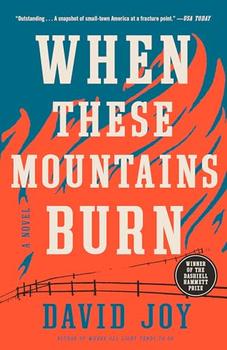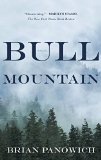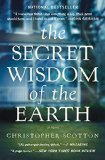Summary | Excerpt | Reviews | Beyond the book | Read-Alikes | Genres & Themes | Author Bio

When These Mountains Burn by David Joy revolves around an illegal narcotics operation in rural North Carolina. When Ray Mathis retrieves his addict son, Ricky, from a drug dealer — again — he tells the man, "After tonight you don't have any more business with that boy… I don't care if he crawls in here begging, you don't have anything for him." Ray also makes it clear to his son that he won't bail him out again. Both Ricky and the dealer ignore Ray, which results in an epic battle between a stern yet loving father and a dangerous drug kingpin in remote Appalachia. Additional characters on both sides of the law become entangled in the story, including Denny Rattler, a junkie who wants to turn his life around but seems powerless to do so.
The author uses multiple plot threads to set up the action, focusing at times on the dealers and addicts, and at others on the law enforcement agencies trying to shut the operation down. The most captivating story lines by far, though, are those stemming from Ray's and Denny's points of view. Joy's writing is superb as he brings these two compelling men to life; through them, the author demonstrates deep empathy for those impacted by addiction — users and their families alike:
There was a thought that settled onto Ray while he stood in the doorway watching the boy, how when an animal has gone lame it is with mercy that the farmer ends the suffering. That thought left a hollow feeling inside him because this was not some horse that had broken a leg… Being the father of an addict, there was always this ambivalence because you'd watched the same thing over and over for years and years, and you knew deep down that there wasn't a thing you could do to stop it. But at the end of the day, that boy curled up in that bed was still your son, and that was always the part that won out.
Ray comes off as a bit of a stock character; he's the cigar-smoking, overall-wearing, tough-on-the-outside-but-soft-on-the-inside hirsute patriarch present in many books, movies and TV shows set in the rural American South — a dead ringer for Uncle Jesse from Dukes of Hazzard. However, the author makes him surprisingly fresh and sympathetic. Denny is a bit less predictable and equally endearing; one can't help but root for him to turn his life around. The rest of the cast — and it's a large one — aren't exactly one-dimensional, but they're not as fleshed out as these two.
The novel is set against the backdrop of the Tellico Fire, one of the Southeastern United States Wildfires that collectively burned some 90,000 acres across five states in October and November of 2016. Although the conflagration itself doesn't play a large part in the action, the smoke and ash it generates are integral to the atmosphere, creating a gloomy, oppressive feel throughout. It also serves as a metaphor for the march of modernity Ray feels is gradually wiping out the area's way of life. The author skillfully weaves the community of Cherokee, North Carolina into the tale as well, vividly describing the tensions between members of the Eastern Band of Cherokee Indians (see Beyond the Book), which owns much of the area, and the other residents.
I found the book a bit challenging to get into; the multiple plot lines were confusing at first and it seemed like the only thing they had in common was narcotics. The author also does his readers no favor by giving characters similar-sounding names (Ray/Raymond, Rod/Rodriquez, Ricky, Rudolph, etc.), something I've always found makes a plot more difficult to follow. As the story lines meet up and the narrative point-of-view shifts, characters remain anonymous at first, which added to my confusion (for example, Ricky is nameless for many pages when Denny first encounters him). Also, the drug dealers converse in a jargon with which I was unfamiliar, slowing down my reading as I turned to Google for clarification — for example, I had no idea that "horse" refers to heroin, or that "stamps" are small wax packets of drugs. Once I adapted to the dialogue and the story lines began to converge (at about the halfway point), the book flew along and I ended up enjoying it immensely. Readers who have a page limit by which they decide whether or not to abandon a book may want to invest more patience than normal in this one; it's worth the effort.
I found myself loving When These Mountains Burn by its conclusion, and recommend it to readers who enjoy truly well-written and heartfelt fiction. Its rich, relevant themes surrounding the ravages caused by drug addiction and the slow demise of Appalachian culture are sure to make this one a winner for many, and will undoubtedly draw new fans to David Joy's works. This novel would also make a great book group selection.
![]() This review
first ran in the August 19, 2020
issue of BookBrowse Recommends.
This review
first ran in the August 19, 2020
issue of BookBrowse Recommends.

If you liked When These Mountains Burn, try these:

by Brian Panowich
Published 2016
Winner of the 2015 BookBrowse Debut Author Award
From a remarkable new voice in Southern fiction, a multigenerational saga of crime, family, and vengeance.

The Secret Wisdom of the Earth
by Christopher Scotton
Published 2016
Timely and timeless, this is a dramatic and deeply moving novel about an act of violence in a small, Southern town and the repercussions that will forever change a young man's view of human cruelty and compassion.
Your guide toexceptional books
BookBrowse seeks out and recommends the best in contemporary fiction and nonfiction—books that not only engage and entertain but also deepen our understanding of ourselves and the world around us.